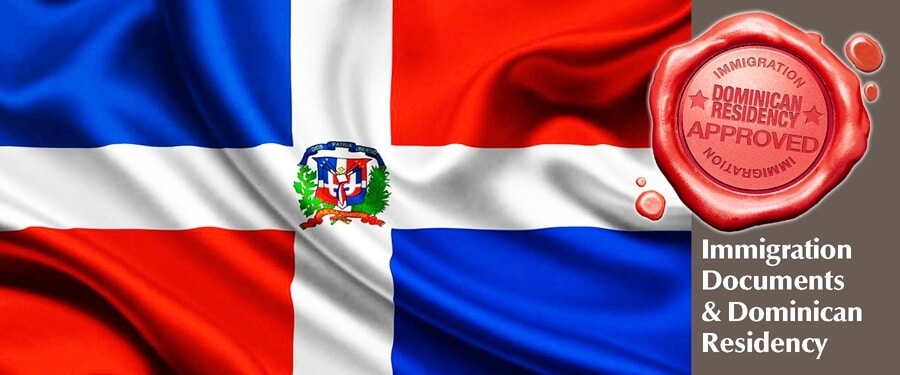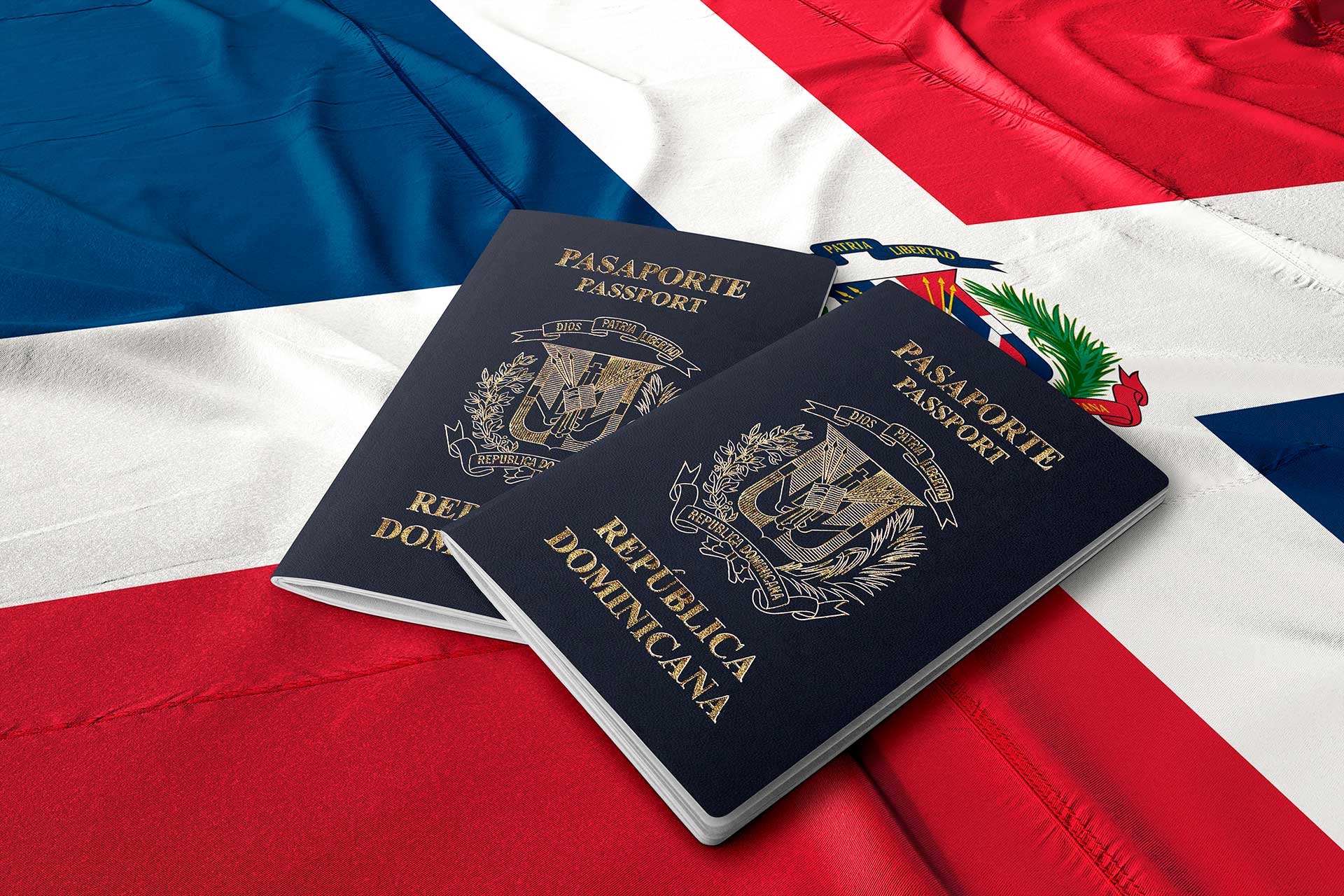Introduction
In general, Dominican law reflects the welcoming nature of the Dominican people, permitting entry of most foreign nationals whether visiting for pleasure, business, or retirement. In addition, many foreign nationals can obtain residency or citizenship by submitting properly prepared documents, completing legal formalities, and waiting prescribed time periods.
Dominican Republic Immigration and Residency Laws
The principal laws regarding immigration are the Constitution, General Immigration Law 285-04, its predecessor Law 95 of 1939, Immigration Regulation No. 631-11, and Law 171-07 regarding special incentives to retirees.

Nationality
Article 18 of the Constitution establishes the following as Dominican nationals:
a) A person born to a mother or father with Dominican nationality, regardless of the country in which the parent lives;
b) A person born in the Dominican Republic, except a person (i) born to a member of a foreign diplomatic service or consulate in the country, (ii) born to an illegal resident, or (iii) born to a foreigner “in transit” as defined by Dominican law;
c) A person marrying a Dominican national, upon fulfillment of the requirements established by law;
d) The direct descendants of Dominicans residing in a foreign country;
e) A person who is naturalized. The naturalization process is governed by Law 1683, enacted in 1948 and administered by the Department of the Interior (Ministerio de Interior y Policía). An applicant must meet specific residency requirements as explained below.
Article 19 of the Constitution stipulates that a naturalized citizen is not eligible to hold the office of President or Vice President of any branch of the Dominican government, and is not required to take up arms against his or her country of origin.
Dominican Republic Immigration and Residency Laws Dual Nationality
Article 20 of the Dominican Constitution permits dual nationalities: a Dominican may acquire another nationality without the risk of losing Dominican nationality; a Dominican national, who has acquired foreign nationality by virtue of birth, may at the age of eighteen choose dual nationality or relinquish one of the two nationalities.
Furthermore, except for becoming President or Vice President of the country, a Dominican with dual nationality may hold any elected office in the Dominican Republic, or be appointed to a ministerial position or a position in the Dominican diplomatic service, without relinquishing his or her foreign nationality. If the person wishes to run for President or Vice President of the country, the Dominican dual national must relinquish the foreign nationality ten years before the scheduled election and reside in the country for ten consecutive years before taking office.
Citizenship
The rights of citizenship are only bestowed upon a Dominican national who has reached the age of eighteen, or who is married or has been married before the age of eighteen (Article 21 of the Constitution).
Thus, although a minor can be a Dominican national, the minor will not have citizenship rights, unless married. Citizenship entitles the person to the right to vote, run for public office, vote on referendums, make requests of public interest to policy makers, and report public officials’ misconduct in the performance of their duties (Article 22 of the Constitution). However, citizenship will be revoked for conviction in assisting or participating in deliberate attacks or harm against the interests of the Dominican Republic, including treason, espionage, conspiracy, or taking up arms against the Republic (Article 23 of the Constitution). In addition, citizenship will be suspended for the duration of (i) a sentence for a felony conviction, (ii) a legally declared incompetency, (iii) acceptance to a position with a foreign State within the Dominican Republic not authorized by the Executive Branch, and (d) a violation of any of the conditions of naturalization (Article 24 of the Constitution).
Dominican Republic Immigration and Residency Laws Foreign Nationals
Under Article 25 of the Dominican Constitution foreign nationals are afforded the same rights and subjected to the same duties as Dominican nationals while in the Dominican Republic, with one exception. A foreign national may not participate in political activities in the country except to vote in elections in the foreign national’s country of origin. If a foreign national encounters legal problems while in the country, the foreign national may request diplomatic protection only after exhausting all available remedies before Dominican authorities and courts, except where international conventions provide otherwise. Foreign nationals must properly register with the Registry of Foreigners (Registro de Extranjeros). General Immigration Law No. 285-04 and Immigration Regulation No. 631-1 govern the flow of migrants to and from the Dominican Republic, and grant the Immigration Department (Dirección General de Migración) the authority to control the national borders and administer the law.
Admission to the Dominican Republic
A foreign national is admitted to the Dominican Republic either as a “nonresident” or “resident.” Nonresidents are those who intend to stay in the country for a limited time for a particular purpose such as pleasure or business, and require a visa or tourist card for legal entry. A resident is a foreign national who is staying in the country for an extended period and has obtained legal residency status, evidenced by a residency card.
Nonresident Status
A nonresident foreign national requires permission to enter and stay in the country. Foreign nationals arriving from countries that are party to a dispensation treaty, generally developed countries, are permitted entry by a tourist card and do not need a visa. Tourist cards are purchased for a nominal amount at one of the country’s international airports at the time of entry and before passing through customs.They are valid for three months.
Foreign nationals who are not citizens of a country covered by such a treaty need to obtain a visa before traveling to the Dominican Republic. Application for a visa is made to a Dominican Consulate in the foreign national’s country of origin, or if no such Consulate exists, to a Dominican Consulate in a nearby country. Several types of visas are available depending on the purpose of the visit: tourist, business, work, and student visas. The criteria required for each varies, and the type of visa granted is determined by the Immigration Department. Visa applications are accepted or denied at the discretion of the government. Visas must be obtained before arrival and are typically valid for three months. They cannot be obtained while in the Dominican Republic.
Dominican Republic Immigration and Residency Laws Residency Status
A foreign national, such as a retiree, a person intent on doing business, or an investor, who seeks to stay in the Dominican Republic for a year or more should consider obtaining residency status. Residency status affords the foreign national legal status in the country entitling the person to an identification card (Cédula de Identidad Personal) and access to a more favorable tax structure. Residency status may only be sought while the foreign national is in the country on a residency visa; applicants must be in good health, have sufficient economic means and a clean police record. The process presently involves two steps: temporary residency and permanent residency. Foreign nationals are prohibited by statute from entering the Dominican Republic for residency purposes in the following cases:
a) Contagious illness threatening to public health, except, under certain requirements, when sponsored by relatives living in the DR.
b) Mental illness or physical disabilities, with certain exceptions.
c) Conviction for a crime (drugs, human trafficking, prostitution, terrorism, and other serious offences).
d) Previous deportation without reentry permit or prohibition from entering the country.
Foreign nationals seeking residency in the Dominican Republic fall into two categories:
a) Those who may apply immediately for permanent residency; and
b) Those who must apply first for temporary residency.
The following applicants may apply immediately for permanent residency status without having to previously obtain temporary residency status:
1) Investors of at least 200,000 USD in local businesses (including free zones and government contracts) or in local financial instruments.
2) Retirees with a monthly pension of at least 1,500 USD (plus 250 USD per dependent).
3) Applicants with monthly income of at least 2,000 USD for five years or more (rentistas).
4) Applicants related to Dominicans or to foreigners with permanent residency status in DR (spouses and children). The application process is essentially the same for both temporary and permanent residency, except for some additional documents required in permanent residency applications.

Expedited Residency
Law 171-07, enacted July 13, 2007, acknowledges the benefit of foreign investments to the general and economic well-being of the Dominican people and nation.
Foreign nationals meeting certain criteria can acquire residency status within forty-five working days from the date an application is admitted for inspection at the Immigration Department (Decree No. 950-01).
Eligibility Criteria
Property owners with rental income, investors, and retirees are eligible to apply for residency on an expedited basis if certain income requirements and other specific criteria are met. The term used to describe this status is “Investment Residency,” and is not always easy to obtain. The foreign national must submit the same documents required for the normal residency process, and additional documents that evidence the foreign national’s eligibility for Investment Residency.
Property Owner with Rental Income
a) Income may be derived from rental property anywhere in the world.
b) Income must be a minimum of US$2000 per month. An additional income of US$250 per month per minor in the immediate family and spouse accompanying the applicant must be added.
c) Proof of rental income evidenced by an official document such as a lease must be certified, authenticated, and translated into Spanish for submission to the Immigration Department.
Investor Criteria
a) The investment must be US$200,000 or more.
b) The investment may be direct or indirect, for example, a real estate transaction, a deposit in a bank account, or an investment in a project in the Dominican Republic.
c) The investment must be registered in the Dominican Republic, evidenced by a Certificate of Investment. Regulation 214-04 on Foreign Investment Registration stipulates the criteria for registering investments with the Department of Export and Investments (CEI-RD). The CEI-RD issues a Certificate of Investment approximately one month from the date of application, and the Certificate must be regularly renewed. The holder of a valid Certificate of Investment can sponsor immediate family members, if an individual, or company employees, if a corporation, for expedited residency.
Retiree Criteria
a) Income must come from a public or private plan providing retirement income.
b) Income must be at least US$1,500 per month. An additional income of US$250 per month per minor in the immediate family and spouse accompanying the applicant must be added.
c) Proof of retirement income must be certified by the plan provider, authenticated, and translated into Spanish and submitted to the Immigration Department.
Processing Time and Residency Validity
Although the time for the expedited process for residency is set at forty-five days, the actual time will depend on how long it takes to authenticate documents in the country of origin, undergo the medical exam, and prepare local documents for submission to the Immigration Department. Investment Residency is valid for one year. One benefit is that within six months of obtaining this status, the foreign national may apply for “Investment Citizenship. If citizenship is not sought, the foreign national has the option of applying for permanent residency.
Citizenship
Anyone eighteen or older may apply for citizenship. Citizenship is granted at the government’s discretion.
The particular situation of the foreign national dictates the application route. The three most common avenues are as (i) a child born in another country to a Dominican citizen, (ii) a spouse of a Dominican citizen, or (iii) a resident.
Child of a Dominican Citizen
Under the Constitution, a child born to a Dominican citizen in another country is a Dominican national and entitled to citizenship. The choice of Dominican citizenship is optional and not automatic; it requires an intentional act by the person upon reaching the age of eighteen or after, and includes filing formal papers with the authorities.
Documents required are the original birth certificates of the applicant and of the Dominican parent(s), and a copy of the parent’s Dominican identification card (Cédula de Identidad Personal).
Spouse of a Dominican Citizen
A foreign national who legally marries a Dominican citizen may apply for citizenship after six months of marriage, no matter the location of the marriage. The foreign spouse must provide an authenticated and translated copy of the marriage certificate and the documents shown below under Residents, with some variations.
Residents
A foreign national with Permanent or Investment Residency status may apply for citizenship after the prescribed waiting periods of two years for permanent residency and six months for investment residency.
Residency status must be active to apply for citizenship. The documents required for citizenship are: an authenticated and translated copy of the birth certificate from the foreign national’s country of origin; the original and colored copies of the foreign national’s passport; photos of the foreign national in a prescribed format; the renewed residency card; and an affidavit prepared by a Dominican attorney and signed by the foreign national.
Citizenship Procedure
Once the proper documents for one of the above cases are ready, the application for citizenship is filed with the Department of Interior. Approximately two weeks after filing, the foreign national will be called to appear personally before the Department of Interior in the Dominican Republic for an interview, conducted solely in Spanish. The questions and answers can be reviewed before the interview. Within five months after the interview, the foreign national will be summoned to personally take the oath of citizenship, granted and signed by the President of the Dominican Republic. Approximately two months after taking the oath, the foreign national will be issued a Dominican birth certificate, and be permitted to obtain a Dominican identification card (Cédula de Identidad Personal). The foreign national must appear personally to obtain the identification card from the issuing government office. With the identification card and evidence of citizenship, the new citizen is entitled to apply for a Dominican passport, a separate but relatively simple process.
GUZMÁN ARIZA ON IMMIGRATION
Guzmán Ariza is the premier law firm in the Dominican Republic for immigration with a vibrant practice serving Fortune 500 clients such as Coca-Cola, Johnson & Johnson, The Gap, Kraft Foods, etc. Our lawyers have convenient access to the Immigration Department and assist company executives, investors and retirees seeking residency or citizenship. We perform regular and personal checks on the status of every application to provide clients with immediate notice when papers are ready.
Many foreigners living in the Dominican Republic question the usefulness of obtaining resident status given the lax enforcement of immigration laws by the Dominican government. In fact, however, foreigners who have obtained their residencies enjoy very definite advantages over the illegal alien, among them, the following:
- A legal resident can work and do business legally in the Dominican Republic; a nonresident cannot.
- A resident is allowed to bring in tax free his household items, ranging from kitchen appliances, to furniture (Article 13 of Law #146-00). A nonresident must pay applicable duties on these goods.
- For many foreigners interested in not paying taxes in their home countries on income earned outside their home country, it is a prerequisite to obtain residency status in another country.
- A resident can enter the Dominican Republic without having to buy a tourist card; a nonresident must obtain a visa or buy a tourist card.
- A resident in certain categories can obtain significative tax exemptions.
- A resident can obtain a Dominican driver’s license and car insurance; a nonresident can drive with his own driver’s license and obtain car insurance that will be valid ONLY for the length of his LEGAL stay in the DR.
Dominican Republic Immigration and Residency Laws
